基因多态性与各种肿瘤的关系
TS基因多态性与肿瘤相关研究进展
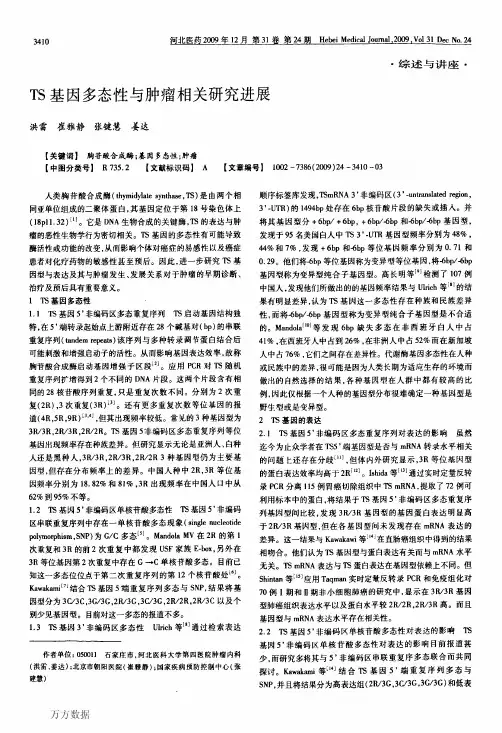
3410煎jE匡蕴2Q鲤生!兰旦箜!!鲞笠丝捆旦!堕i丛型堡坐』!坚婴坐:兰Q螋:!!!三!旦塑塑竺:丝TS基因多态性与肿瘤相关研究进展洪雷崔雅静张键慧姜达【关键词】胸苷酸合成酶;基因多态性;肿瘤【中图分类号】R735.2【文献标识码】A【文章编号】1002—7386(2009)24—3410—03人类胸苷酸合成酶(thymidylatesynthase,TS)是由两个相同亚单位组成的二聚体蛋白,其基因定位于第18号染色体上(18p11.32)…。
它是DNA生物合成的关键酶,俗的表达与肿瘤的恶性生物学行为密切相关。
TS基因的多态性有可能导致酶活性或功能的改变,从而影响个体对癌症的易感性以及癌症患者对化疗药物的敏感性甚至预后。
因此,进一步研究幅基因型与表达及其与肿瘤发生、发展关系对于肿瘤的早期诊断、治疗及预后具有重要意义。
1TS基因多态性1.1Ts基因5’非编码区多态重复序列偈启动基因结构独特,在5’端转录起始点上游附近存在28个碱基对(bp)的串联重复序列(tandemrepeats)该序列与多种转录调节蛋白结合后可能刺激和增强启动子的活性。
从而影响基因表达效率,故称胸苷酸合成酶启动基因增强子区段旧J。
应用PCR对Ts随机重复序列扩增得到2个不同的DNA片段。
这两个片段含有相同的28核营酸序列重复,只是重复次数不同。
分别为2次重复(2R),3次重复(3R)¨J。
还有更多重复次数等位基因的报道(4R,5R,9R)¨一J,但其出现频率较低。
常见的3种基因型为3R/3R,2R/3R,2R/2R。
'IS基因5非编码区多态重复序列等位基因出现频率存在种族差异。
但研究显示无论是亚洲人、白种人还是黑种人,3R/3R,2R/3R,2R/2R3种基因型仍为主要基因型,但存在分布频率上的差异。
中国人种中2R,3R等位基因频率分别为18.82%和8l%,3R出现频率在中国人口中从62%到95%不等。
人类基因多态性和疾病的关系
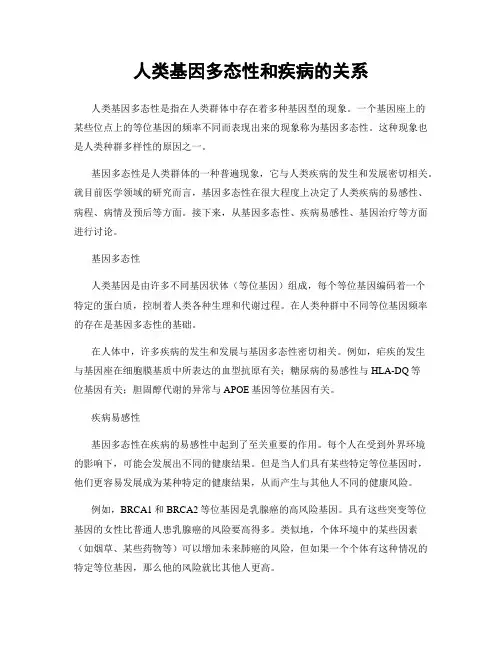
人类基因多态性和疾病的关系人类基因多态性是指在人类群体中存在着多种基因型的现象。
一个基因座上的某些位点上的等位基因的频率不同而表现出来的现象称为基因多态性。
这种现象也是人类种群多样性的原因之一。
基因多态性是人类群体的一种普遍现象,它与人类疾病的发生和发展密切相关。
就目前医学领域的研究而言,基因多态性在很大程度上决定了人类疾病的易感性、病程、病情及预后等方面。
接下来,从基因多态性、疾病易感性、基因治疗等方面进行讨论。
基因多态性人类基因是由许多不同基因状体(等位基因)组成,每个等位基因编码着一个特定的蛋白质,控制着人类各种生理和代谢过程。
在人类种群中不同等位基因频率的存在是基因多态性的基础。
在人体中,许多疾病的发生和发展与基因多态性密切相关。
例如,疟疾的发生与基因座在细胞膜基质中所表达的血型抗原有关;糖尿病的易感性与HLA-DQ等位基因有关;胆固醇代谢的异常与APOE基因等位基因有关。
疾病易感性基因多态性在疾病的易感性中起到了至关重要的作用。
每个人在受到外界环境的影响下,可能会发展出不同的健康结果。
但是当人们具有某些特定等位基因时,他们更容易发展成为某种特定的健康结果,从而产生与其他人不同的健康风险。
例如,BRCA1和BRCA2等位基因是乳腺癌的高风险基因。
具有这些突变等位基因的女性比普通人患乳腺癌的风险要高得多。
类似地,个体环境中的某些因素(如烟草、某些药物等)可以增加未来肺癌的风险,但如果一个个体有这种情况的特定等位基因,那么他的风险就比其他人更高。
基因治疗随着基因研究的发展,基因治疗已成为目前医学研究中一个重要的方向。
基因治疗可以通过调整或改变特定基因在患者体内表达的方式,从而达到治疗疾病的目的。
比如说,固缩斑症(PKU)是一种由于身体缺乏酪氨酸羟化酶而引起的遗传疾病,患者可能会造成智力和神经系统损害。
目前,科学家们已经开发出了一种方法来治疗PKU,该方法利用了基因治疗的原理。
他们将正常基因序列注入血管中,以便它能够进入肝细胞并在患者体内表达正常的酪氨酸羟化酶,以代替缺少的酶,从而缓解患者的症状。
基因突变和多态性在肿瘤发生和治疗中的作用

基因突变和多态性在肿瘤发生和治疗中的作用在医学领域,基因突变和多态性是一个备受关注的话题。
越来越多的研究表明,基因突变和多态性与肿瘤的发生和治疗密切相关。
本文将分别从基因突变和多态性两个方面探讨它们在肿瘤发生和治疗中的作用。
基因突变在肿瘤发生中的作用基因突变是指DNA序列发生改变,可能导致基因功能的丧失或改变。
基因突变在肿瘤发生中扮演着非常重要的角色。
许多肿瘤的发生都与特定基因的突变有关。
例如,BRCA基因是一个常见的肿瘤相关基因。
BRCA1和BRCA2基因突变导致的基因缺失,是乳腺癌和卵巢癌的最常见原因。
这些基因突变主要影响DNA修复机制,使细胞容易发生异常分裂,最终导致肿瘤的发生。
此外,有些基因主要参与肿瘤的生长和扩散。
例如,EGFR、KRAS、BRAF等基因突变会导致肺癌、结肠癌、黑色素瘤等肿瘤的发生和恶化。
基因突变在肿瘤治疗中的作用基于基因突变的个体化医疗模式,为肿瘤治疗带来了新的思路。
此类个体化治疗常被称为“靶向治疗”。
靶向治疗基于肿瘤细胞上出现的特定异质性表面分子或其活性靶标,从而进行精准打击。
因此,基于基因突变的靶向治疗比化疗治疗更加精准,能够在最短时间内得到更好的治疗效果。
例如,EGFR是一种膜受体,经常出现在非小细胞肺癌中。
发现肺癌患者中EGFR基因突变的比例为20%~30%。
这些患者的治疗取决于突变变体的类型。
对于某些EGFR突变亚型,替尼(一种靶向治疗药物)的治疗效果非常理想。
而对于其他部分亚型,则建议使用其他治疗方案。
这使得EGFR突变患者的治疗效果更好,且副作用更少。
多态性在肿瘤发生中的作用多态性是指同一基因不同个体间存在的基因型和表现型差异。
例如,不同人的基因中心里面的ACTN3基因可能是不同的多态性。
多态性不仅影响人体对药物的代谢,也可能影响肿瘤的发生和进展。
多项研究表明,基因多态性与肿瘤的发生和治疗有关。
例如,GSTT1、GSTM1基因多态性可能与结肠癌的发生、头颈癌的死亡率、白细胞介素-2治疗其它肿瘤的反应等方面有关。
CYP2C19基因多态性与肿瘤易感性关系的研究进展
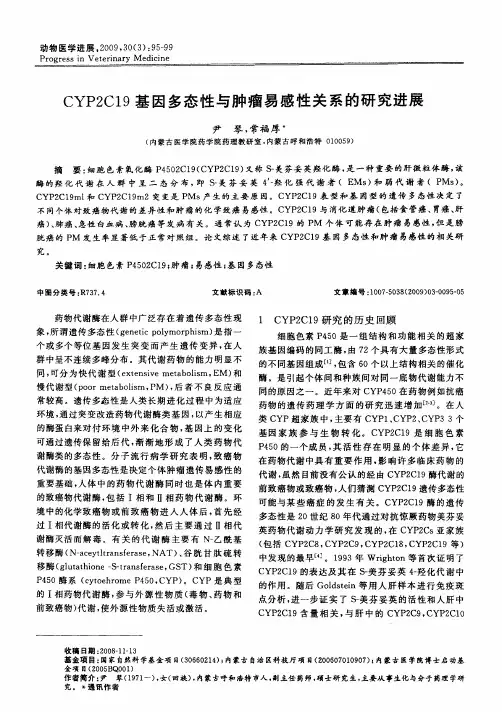
c P c 9的表达 及其 在 S美 芬 妥英 4羟化 代谢 中 Y 2l - 一
的作用 。随后 God ti lsen等用 人 肝 样 本进 行 免疫 斑
的 I相药物代 谢 酶 , 与 外 源性 物质 ( 物 、 物 和 参 毒 药 前致 癌物 ) 代谢 , 使外 源性物 质失 活或激 活 。
慢代谢 型( o r tb l m, M) 后 者 不 良反 应通 p o a oi P , me s 常较高 。遗传多态性 是人类 长期 进化 过 程 中为适应
环境 , 通过 突变改造 药物代 谢酶类 基 因 , 以产 生相应 的酶蛋 白来对付 环 境 中外 来 化合 物 , 因上 的变 化 基 可通过遗传保 留给后 代 , 渐 地 形 成 了人 类 药 物代 渐 谢酶类 的多态性 。分 子 流 行 病学 研 究 表 明 , 癌物 致 代谢酶 的基因多态性 是决 定个体 肿瘤 遗传 易 感性 的 重要基础 , 人体 中 的药 物代 谢 酶 同时 也 是体 内重 要 的致癌物代谢 酶 , 括 I相 和 Ⅱ相药 物 代 谢 酶 。环 包
境 中的化学致 癌 物 或前 致 癌 物进 入人 体 后 , 先 经 首
过 I相代谢 酶的 活化 或 转 化 , 然后 主要 通 过 Ⅱ相代
谢 酶灭活 而解 毒 。有 关 的 代 谢 酶 主 要 有 N 乙 酰 基 一 转 移酶 ( ae t rn frs , N—cyl a seae NAT) 谷 胱 甘 肽硫 转 t 、 移酶 ( lttin Sta seae GS 和 细 胞 色 素 guaho e—-rn frs , T) P5 4 0酶 系 (yo ho 4 0 C P 。CY cte rmeP 5 , Y ) P是典 型
胱 癌 的 P 发 生率显著低 于正 常对 照组。论 文综述 了近年 来 C 2 9基 因 多态性 和肿 瘤 易感性 的相 关研 M YP C1
人类基因多态性与疾病的关系分析
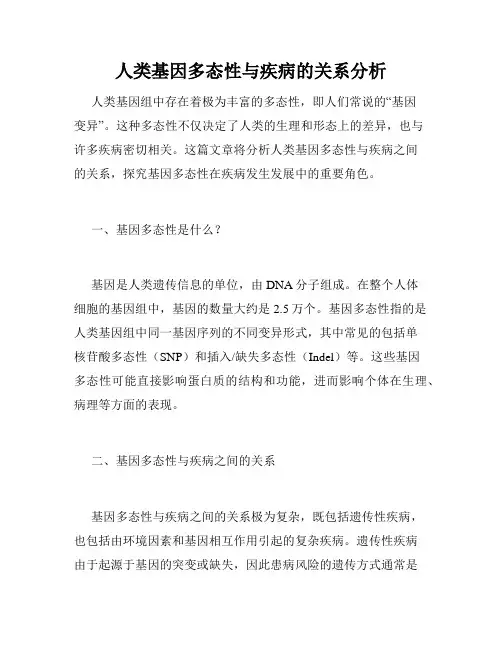
人类基因多态性与疾病的关系分析人类基因组中存在着极为丰富的多态性,即人们常说的“基因变异”。
这种多态性不仅决定了人类的生理和形态上的差异,也与许多疾病密切相关。
这篇文章将分析人类基因多态性与疾病之间的关系,探究基因多态性在疾病发生发展中的重要角色。
一、基因多态性是什么?基因是人类遗传信息的单位,由DNA分子组成。
在整个人体细胞的基因组中,基因的数量大约是2.5万个。
基因多态性指的是人类基因组中同一基因序列的不同变异形式,其中常见的包括单核苷酸多态性(SNP)和插入/缺失多态性(Indel)等。
这些基因多态性可能直接影响蛋白质的结构和功能,进而影响个体在生理、病理等方面的表现。
二、基因多态性与疾病之间的关系基因多态性与疾病之间的关系极为复杂,既包括遗传性疾病,也包括由环境因素和基因相互作用引起的复杂疾病。
遗传性疾病由于起源于基因的突变或缺失,因此患病风险的遗传方式通常是简单的单基因遗传。
常见的遗传性疾病包括囊性纤维化、苯丙酮尿症和地中海贫血等,这些疾病与特定基因的突变密切相关。
例如,囊性纤维化是由CFTR基因的突变引起的,苯丙酮尿症则源于PAH基因的突变。
复杂疾病则更为常见,这些疾病如高血压、糖尿病、哮喘、癌症等,由环境、遗传和相互作用等多种因素共同作用而引起。
在复杂疾病中,基因多态性对个体患病风险的影响往往是渐进性的并且是相对的。
例如,在冠心病的发病中,APOE基因多态性的影响随着年龄增长而增加。
三、基因多态性的研究方法目前,研究基因多态性与疾病之间的关系主要采用全基因组关联研究(GWAS)和功能基因组学两种方法。
GWAS是通过大样本研究,对表型、基因型和环境因素进行分析,从而找到与疾病相关的SNP。
功能基因组学则是研究基因与基因之间的相互作用关系,可以深入剖析基因在疾病发生发展中的详细机制。
这两种方法的结合可以大大提高研究效率和科技准确性。
四、基因多态性研究的局限性研究基因多态性与疾病之间的关系还面临着一些困难和限制。
遗传多态性与肿瘤发生之间的相关性分析
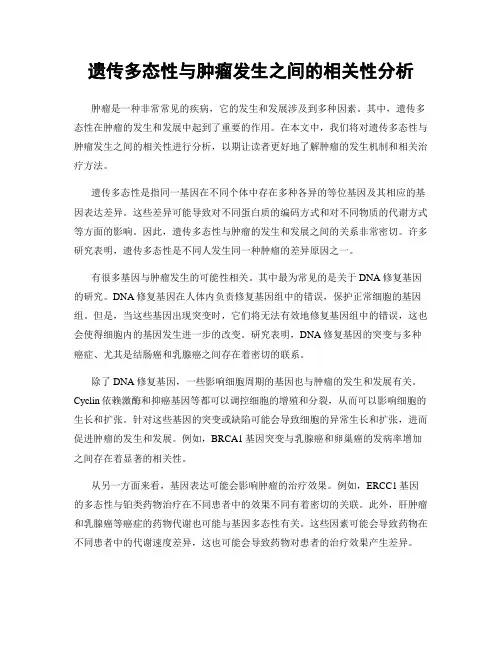
遗传多态性与肿瘤发生之间的相关性分析肿瘤是一种非常常见的疾病,它的发生和发展涉及到多种因素。
其中,遗传多态性在肿瘤的发生和发展中起到了重要的作用。
在本文中,我们将对遗传多态性与肿瘤发生之间的相关性进行分析,以期让读者更好地了解肿瘤的发生机制和相关治疗方法。
遗传多态性是指同一基因在不同个体中存在多种各异的等位基因及其相应的基因表达差异。
这些差异可能导致对不同蛋白质的编码方式和对不同物质的代谢方式等方面的影响。
因此,遗传多态性与肿瘤的发生和发展之间的关系非常密切。
许多研究表明,遗传多态性是不同人发生同一种肿瘤的差异原因之一。
有很多基因与肿瘤发生的可能性相关。
其中最为常见的是关于DNA修复基因的研究。
DNA修复基因在人体内负责修复基因组中的错误,保护正常细胞的基因组。
但是,当这些基因出现突变时,它们将无法有效地修复基因组中的错误,这也会使得细胞内的基因发生进一步的改变。
研究表明,DNA修复基因的突变与多种癌症、尤其是结肠癌和乳腺癌之间存在着密切的联系。
除了DNA修复基因,一些影响细胞周期的基因也与肿瘤的发生和发展有关。
Cyclin依赖激酶和抑癌基因等都可以调控细胞的增殖和分裂,从而可以影响细胞的生长和扩张。
针对这些基因的突变或缺陷可能会导致细胞的异常生长和扩张,进而促进肿瘤的发生和发展。
例如,BRCA1基因突变与乳腺癌和卵巢癌的发病率增加之间存在着显著的相关性。
从另一方面来看,基因表达可能会影响肿瘤的治疗效果。
例如,ERCC1基因的多态性与铂类药物治疗在不同患者中的效果不同有着密切的关联。
此外,肝肿瘤和乳腺癌等癌症的药物代谢也可能与基因多态性有关。
这些因素可能会导致药物在不同患者中的代谢速度差异,这也可能会导致药物对患者的治疗效果产生差异。
综合以上所述,遗传多态性是肿瘤发生和发展中一个非常重要的因素。
多种基因的突变和多态性可能会导致细胞异常生长和扩张,增加肿瘤的发生率。
针对遗传多态性进行治疗和选择合适的药物,则可以提高治疗的效果和降低药物的副作用。
肿瘤坏死因子α启动子基因多态性与胸腺瘤的相关性
8 3 3 8, 2 8 8 6, n 8 7weea ay e np t n swiht y ma a h wihc n r l u jcs 6 ,一0 一 3 ,一0 a d一 5 r n lzd i ai t t h mo ,ec t o to be t.Reut A e s sl s
c e ,ZHU a — u n,LI Ha— e g,S IHu— ig,QI hn Xi oq a lf n H i n j AO h n s a S a —h n,ZHANG ay e,WANG h — Ji— u S u
h i De a t n f N e r lg u. p rme t u oo y,Bejn in h p H opi l o ii gFre dsi s t ,Ca ia e ia i est Bejn 0 0 0, a p t l d c lUn v riy, M ii g 1 0 5
Chi a n
C rep n ig a to :XI n c e Emal o rs o dn u h r E Ya -h n, i:ma k rg n 1 3 c m rd ao @ . o 6
ABS RA T CT: Ob et e To iv siae t e rlt n h p ft mo er ss fco - ( jci v n e t t h eai s i o u r n co i a t ra TNF a)p o tr g o — r moe
中国神经免疫学和神经病学杂壹
生 旦蔓 鲞箜 塑
! 望
!!
: ! ! : ! ! :
・
21 ・ 5
肿 瘤 坏 死 因子 启 动 子 基 因多 态 性 与 胸腺 瘤 的相关
基因多态性与人类疾病的关系
基因多态性与人类疾病的关系在人类基因组中,有些基因存在多个等位基因(allele),也就是说,同一个基因能够有不同的表现形态。
这种现象被称为基因多态性(genetic polymorphism)。
基因多态性对于人类的生命健康具有重要的影响,因为它能够决定某些人是否容易患上某些疾病,或者在患病后不同的治疗效果。
本文将从以下几个方面阐述基因多态性与人类疾病的关系。
一、基因多态性与药物代谢酶药物是治疗疾病的主要手段之一。
然而,不同的人对于同一种药物的反应可能存在差异。
这个差异部分源于基因多态性。
举个例子,肝脏中存在一种叫做细胞色素P450 (CYP450) 的酶系统,它是许多药物代谢的主要途径。
然而,CYP450 系统的不同亚型之间存在基因多态性,这就导致了不同的人对于同一种药物代谢速度的不同。
如果某个患者存在一种药物代谢酶的突变,使得他的代谢速度较慢,那么他就需要更少的药物才能产生和其他人一样的效果,否则可能会出现过度药效或药物副作用。
因此,在临床上判断合适的药物剂量会考虑患者的基因多态性。
二、基因多态性与疾病易感性人类有些疾病的发生和基因多态性有密切关系。
例如,乳腺癌、子宫内膜癌等妇科肿瘤患者中,存在一种特定的BRCA1 基因变异。
这种基因变异使得患者乳腺癌和卵巢癌的风险增加很多倍。
另外,糖尿病、哮喘、心血管疾病等也和基因多态性有关。
基因多态性决定了某些人是否容易患上这些疾病,在对这些疾病的防治上也有着重要的意义。
例如,针对某些人可能存在的基因易感性,我们可以通过生活方式、营养等方面进行干预,减少疾病的风险。
三、基因多态性与个性化医疗随着基因测序技术的进步,我们将更好地了解基因多态性与人类疾病的关系。
个性化医疗将基于患者的基因多态性定制治疗方案,从而实现更好的疗效和安全性。
例如,在细胞治疗领域,针对患者基因多态性的治疗才能产生最好的效果,而不同的治疗方法也可能对于不同的基因多态性有不同的效果。
因此,在良性肿瘤和癌症的治疗中,也在逐渐发展基于基因多态性的个性化医疗。
基因多态性与疾病发生的关系
基因多态性与疾病发生的关系人体基因是一个复杂的系统,它决定了我们的身体构造和功能,同时也影响着我们的健康状况。
基因多态性是指在一个物种中存在不同的基因变异,这些变异可能影响着个体的基因表达和功能。
一些基因多态性与疾病的发生密切相关,下面我们来探讨一下基因多态性与疾病发生的关系。
1. 基因多态性与心血管疾病心血管疾病是一类最常见的疾病之一,它的发生和基因有很大的关系。
人体中有一种基因叫做APOE,该基因有三种常见的多态性:ε2、ε3和ε4。
研究表明,ε4基因与冠心病、高血压、中风等心血管疾病的风险密切相关。
此外,一些其他的基因变异,例如ACE基因的I/D多态性、AGT基因M235T多态性等,也与心血管疾病的风险有关。
2. 基因多态性与肿瘤肿瘤是一种常见的、严重威胁人类健康的疾病,其发生机理涉及到多个因素,其中基因多态性是一个重要的影响因素。
举例来说,人体中有一种基因叫做BRCA1,该基因突变可以导致乳腺癌、卵巢癌的发生风险增加。
此外,基因多态性也与一些其他的肿瘤风险相关,例如p53基因、GST基因、CYP1A2基因等。
3. 基因多态性与自闭症自闭症是一种儿童期神经发育障碍性疾病,其病因十分复杂,涉及到遗传和环境等多个因素。
然而,一些研究表明,一些基因多态性突变也与自闭症的风险相关。
例如,人体中有一种基因叫做CNTNAP2,它与大脑信号传导和语言、社交能力等方面的功能有关。
CNTNAP2的多态性突变可以导致自闭症的风险增加。
4. 基因多态性与代谢疾病代谢疾病是指由代谢紊乱导致的一系列疾病,例如糖尿病、肥胖症等。
基因多态性是这些疾病发生的风险因素之一。
例如,人体中有一种基因叫PPARG,其多态性变异与2型糖尿病、肥胖症、高血压等代谢疾病的发生密切相关。
总之,基因多态性与疾病发生密切相关,不同的基因变异可能影响着一个人的疾病风险。
了解自己的基因多态性,可以帮助我们预防一些潜在的疾病风险,提高自己的生命质量。
基因多态与乳腺癌妇女的临床病理类型的关联分析
基因多态与乳腺癌妇女的临床病理类型的关联分析引言乳腺癌是女性中最常见的恶性肿瘤之一,其发病率和死亡率逐年增加。
乳腺癌的病理类型对治疗方案和预后评估都起着重要作用。
近年来,研究发现基因多态性与乳腺癌的发生和发展密切相关。
本文旨在探讨基因多态性与乳腺癌妇女的临床病理类型之间的关联。
一、基因多态性与乳腺癌风险的关系基因多态性指的是基因序列存在变异,且同一基因在不同个体间的存在频率不同。
研究发现,某些基因多态性与乳腺癌的发生风险密切相关。
例如,BRCA1和BRCA2基因中的突变与高遗传性乳腺癌风险有关。
二、基因多态性与乳腺癌病理类型的关联2.1 激素受体相关基因多态性与病理类型雌激素受体(ER)、孕激素受体(PR)与乳腺癌的发生和发展密切相关。
研究发现,ER基因的多态性可能与乳腺癌的病理类型有关。
例如,某些ER基因的多态性突变与乳腺癌的浸润性导管癌相关。
此外,PR基因多态性也与乳腺癌的临床病理类型存在关联。
2.2 代谢酶基因多态性与病理类型代谢酶是参与药物代谢和激素代谢的重要酶类。
研究发现,某些代谢酶基因多态性与乳腺癌的病理类型有密切关联。
例如,CYP2D6基因的多态性与乳腺癌的浸润性导管癌相关。
此外,GST 基因和UGT基因的多态性也与乳腺癌的临床病理类型存在关联。
2.3 DNA修复基因多态性与病理类型DNA修复系统是维持基因组稳定性的重要机制,与乳腺癌的发生和发展密切相关。
研究发现,某些DNA修复基因的多态性与乳腺癌的不同病理类型有关。
例如,XRCC1基因的多态性与乳腺癌的浸润性导管癌和浸润性小叶癌相关。
三、基因多态性与乳腺癌病理类型预后的关联乳腺癌的病理类型对患者的预后评估具有重要意义。
基因多态性与乳腺癌病理类型预后的关联也成为研究的热点。
例如,研究发现,某些基因多态性可能与乳腺癌的转移率和生存率相关。
此外,基因多态性还可能影响患者对化疗药物的敏感性,进而对治疗效果和预后产生影响。
结论基因多态性与乳腺癌妇女的临床病理类型存在密切关联。
- 1、下载文档前请自行甄别文档内容的完整性,平台不提供额外的编辑、内容补充、找答案等附加服务。
- 2、"仅部分预览"的文档,不可在线预览部分如存在完整性等问题,可反馈申请退款(可完整预览的文档不适用该条件!)。
- 3、如文档侵犯您的权益,请联系客服反馈,我们会尽快为您处理(人工客服工作时间:9:00-18:30)。
2003 年Kripp l等[ 1 ]报道VEGF 936 C等位基因携带者患乳腺癌的危险性降低,1 Kripp l P, LangsenlehnerU, RennerW, et al. A common 936 C /Tgene polymorphism of vascular endothelial growth factor is associatedwith decreased breast cancer risk. Int J Cancer, 2003, 106: 4682471.我们进行了一系列的生长因子基因多态性与结直肠癌关系的研究,已经发现VEGF 61 G/G基因型和G等位基因与结直肠癌的发生有关[ 9 ] 。
VEGF936 T/C 基因多态性与结直肠癌关系的研究表明VEGF 936 C /C基因型或936 C等位基因与结直肠癌的生成无关,但有助于减少术后结肠吻合口瘘的发生。
含有VEGF 936 T基因的结直肠癌患者术后并发吻合口瘘的机会增加,或许VEGF 936 T基因可作为检测结直肠癌或预测结直肠癌术后并发吻合口瘘的一个危险因素,但这需要进一步的研究。
同时观察这一基因多态性在其他伤口愈合并发症中的作用也将很有意义。
血管内皮生长因子936 T/C基因多态性与结直肠癌及术后吻合口瘘的关系吴国洋王效民Michael Keese Till Hasenberg JÊrgW. Sturm血管内皮生长因子基因多态性与肺癌危险度的关系Lee SJ , Lee SY, Jeon HS, et al/ / Cancer Ep idemiol Biomarkers Prev, 2005, 14: 571 - 575背景和目的:血管生成是包括肺癌在内的恶性肿瘤发生、发展和转移中的一个重要过程。
血管内皮生长因子基因( vascular endothelial growth factor, VEGF)变异可以导致其编码蛋白的产量和活性的改变,通过作用于肿瘤的血管生成过程,从而引发个体对肺癌易感性的差异。
为了检验这一假设,作者研究了韩国人VEGF基因的3个单核苷酸多态性( - 460T >C、+ 405C > G和936C > T)及其单倍型和肺癌危险度之间的关系。
方法:研究对象包括432名肺癌患者和432名年龄和性别匹配的对照。
运用贝叶斯定理构建单体型。
采用logistic回归校正相关协变量计算OR值。
结果:在+ 405位点,与CC和CG基因型比较, GG基因型个体小细胞肺癌危险度显著降低,调整OR 值为0136, 95%可信限为0117~0178; 936位点变异基因型(CT和CT + TT)个体较野生基因型(CC)个体小细胞肺癌的危险度降低,调整OR值分别为0147和0144, 95%可信限分别为0126~0185和0124~0180。
CGT单体型与小细胞肺癌的危险度降低相关,调整OR值为0139, 95%可信限为0118~0187;而TCC与小细胞肺癌的危险度增加相关,调整OR 值为1163, 95%可信限为1114~2133。
上述多态性对小细胞肺癌以外的肺癌类型的危险度没有影响。
单体型TCT和TGT与整体肺癌危险度相关,调整OR值分别为0138和3194, 95%可信限分别为0125~0160和2100~7176, TCT和TGT单体型的这种作用在3种主要的肺癌组织类型中均有发现。
结论: VEGF基因多态性与个体肺癌遗传易感性有关。
(冷曙光)Objectives: Vascular endothelial growth factor (VEGF) is a potent stimulusof angiogenesis that has an important role in many humanmalignancies including prostate carcinoma (PCa). We evaluated the role of the functional VEGF polymorphisms as genetic markers forPCa susceptibility and prognosis. Methods: The study included 101 patients with PCa and the 100 age-matched healthy men. The VEGFgenotypes _1154G > A were identified by allele-specific polymerase chain reaction (AS-PCR) and the genotypes _634G > C and936C > T were identified by restriction fragment lengthpolymorphism-polymerase chain reaction (RFLP-PCR). Results: A negative association was found between VEGF _1154AA genotype and PCa risk (OR = 0.27; P = 0.009). Furthermore, the presence of theVEGF _1154A allele appeared to be associated with an increased risk of higher tumor grade (OR = 0.37; P = 0.01). A significantincreased risk of prostate cancer was associated with the VEGF _634 (GC + CC) combined genotype (OR = 1.95; P = 0.02). The VEGF_634C allele was associated with the aggressive phenotype of prostate cancer as defined by the high histological grade (OR = 3.48;P = 0.007). The VEGF _1154A/_634G haplotype was negatively associated with PCa risk (OR = 0.48; P = 0.005) and high tumorgrade compared to low grade (OR = 0.37; P = 0.02). Conclusions: Genetic variations in the VEGF may predict not only PCa riskbut also tumor aggressiveness.Association of VEGF genetic polymorphisms with prostatecarcinoma risk and clinical outcomeSana Sfar a,*, Elham Hassen a, Hamadi Saad b, Faouzi Mosbah c, Lotfi Chouchane aa Laboratoire d’Immuno-Oncologie Mole′culaire, Faculte′ de Me′decine de Monastir, Universite′ de Monastir, Tunisiab Service d’Urologie, Hopital Universitaire Fattouma Bourguiba, Monastir, Tunisiac Service d’Urologie, Hopital Universitaire Sahloul, Sousse, TunisiaReceived 1 February 2006; received in revised form 7 June 2006; accepted 2 July 2006Abbreviations used: PCa, prostate carcinoma; VEGF, vascular endothelialgrowth factor; DC, dendritic cells; NF-j B, nuclear factor-j B; SNP,single nucleotide polymorphism; PSA, prostate-specific antigen; RFLPPCR,restriction fragment length polymorphism PCR; AS-PCR, allelespecific PCR; OR, odds ratio.Associations of Single Nucleotide Polymorphisms inthe Vascular Endothelial Growth Factor Gene with the Characteristics and Prognosis of Renal Cell CarcinomasYoshihisa Kawai, Shigeru Sakano, Yoshihito Korenaga, Satoshi Eguchi, Katsusuke Naito *Department of Urology, Yamaguchi University School of Medicine, Yamaguchi, JapanObjectives: Vascular endothelial growth factor (VEGF) is considered to playcritical roles in tumor development and progression, especially in renal cellcarcinoma (RCC) via von Hippel-Lindau gene inactivation. Although VEGF_2578CC, _1154GG, and _634CC genotypes are reportedly correlated withhigher levels of VEGF production, no previous studies have reported on theassociations of these polymorphisms with RCCs. This study was aimed toclarify the effects of these functional polymorphisms on RCC progressionand prognosis.Methods: Weinvestigated the associations of three polymorphisms(_2578C/A, _1154G/A, and _634C/G) in the VEGF gene with the clinicopathologicparameters and survival of 213 patients with RCC. The _2578C/A and_634C/G polymorphisms were genotyped using a polymerase chain reaction(PCR) restriction fragment lengthpolymorphismtechniqueandthe_1154G/Apolymorphism was genotyped by an amplification refractory mutation systemPCR technique.Results: The GA + AA genotypes of _1154G/A were weakly associated withsmaller tumors, lower tumor stage, and lower stage grouping ( p = 0.028,p = 0.012, and p = 0.028, respectively). The CA and CA + AA genotypes of_2578C/A were weakly associated with less frequent lymph node metastasis( p = 0.029 and p = 0.034, respectively) and were significantly associatedwith favorable cancer-specific survival ( p = 0.047 and p = 0.048, respectively).There was no apparent clinical effect of the _634C/G polymorphism.Conclusions: These results suggest that some VEGF genotypes may haveeffects on RCC progression or prognosis, possibly through altered VEGFexpression. This finding might help in clarifying the mechanisms of RCCdevelopment and progression.5. ConclusionIn conclusion, our study provides evidence thatsome VEGF genotypes may have effects on RCCprogression or prognosis and that these effectsmay possibly be due to altered VEGF expressionaccording to VEGF polymorphisms. These findingsmight help toward clarifying the mechanisms ofRCC development and progression. However, ourresults were obtained with a limited sample size andtherefore allowed us to draw just preliminaryconclusions. Functional and independent studieswith a larger number of patients are needed toconfirm our results.Archives of Medical Research 39 (2008) 209e211Genetic Polymorphism of VEGF-1154 (A/G)in Laryngeal Squamous Cell CarcinomaZeynep Nil U¨ nal,a Murat U¨ nal,b O¨ zlen Tubay Ba_gdato_glu,a Gu¨rbu¨z Polat,a and U_gur Atik aa Department of Biochemistry andb Department of Otorhinolaryngology, Mersin University School of Medicine, Mersin, TurkeyReceived for publication August 17, 2007; accepted September 24, 2007 (ARCMED-D-07-00379).We conclude that GG genotype of the VEGF gene may increase the risk of laryngeal SCC in this population. VEGF gene polymorphism may be an important potential geneticand therapeutic marker of laryngeal SCC. The major limitations of our study are the modest sample size and matchingproblem in controls and patients according to genderand age. Thus, further studies are necessary to delineatethe potential role of VEGF polymorphism in the susceptibility to laryngeal SCC in a larger population.。
